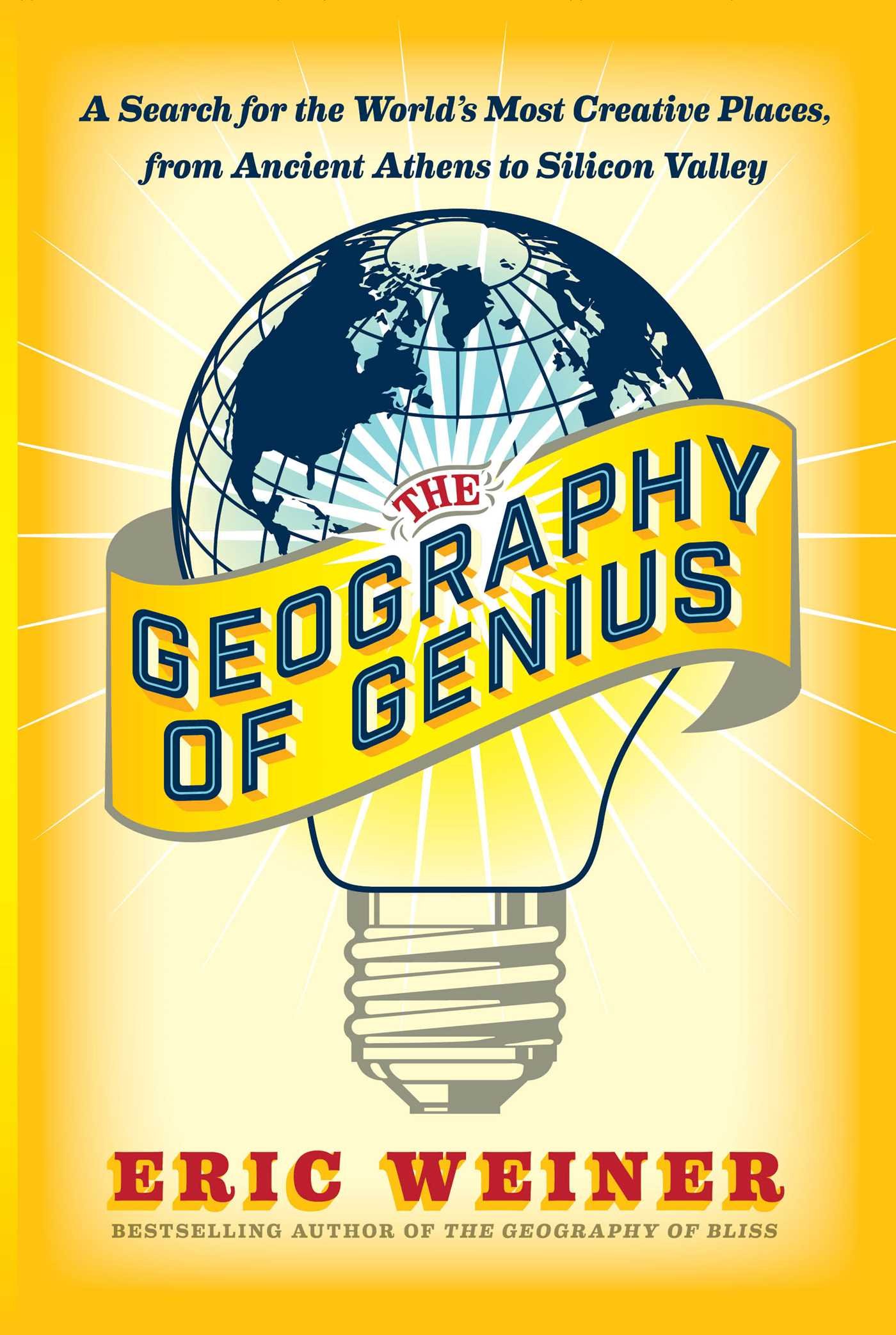The Geography of Genius Summary
6 min read ⌚

A Search for the World’s Most Creative Places From Ancient Athens to Silicon Valley
Are you ready to travel around the world in… well, 400 pages and few days? No? What about in thousand words and merely ten minutes?
Sounds better, we know.
So, without a further ado, the summary of “The Geography of Genius.”
Who Should Read “The Geography of Genius”? And Why?
“The Geography of Genius” is a weird kind of a personal travelogue.
Why?
Because its mission is to answer a strange question. Namely, why do geniuses cluster around specific places at specific moments in history?
However, people who have read Eric Weiner’s previous book, “The Geography of Bliss” – his attempt to discover the world’s happiest places – rather than surprised, will be in rubbing-hands mood.
“The Geography of Genius” is unpretentious and funny, interesting and charming. So, additionally it should be a treat for anyone interested in the interrelation of history and geography.
Or, geniuses, for that matter.
About Eric Weiner
 Eric Weiner is a respected journalist and bestselling writer. A former longtime correspondent for the NPR, he has authored three part-memoirs part-travelogues whose overarching mission is a personal quest for answers to some fairly difficult questions.
Eric Weiner is a respected journalist and bestselling writer. A former longtime correspondent for the NPR, he has authored three part-memoirs part-travelogues whose overarching mission is a personal quest for answers to some fairly difficult questions.
“The Geography of Bliss” tackles an interesting problem: which is the happiest country in the world and why. “Man Seeks God” explores different aspects of many world religions. Finally, “The Geography of Genius,” uncovers how and why is genius related to geography.
“The Geography of Genius Summary”
Our thousands-of-years long and thousands-of-kilometers wide story begins with Keith Simonton, a professor of psychology at the University of California.
One of the topics which interest him the most: geniuses. And one of the concepts he has worked on the longest: genius clusters.
In the past, most people believed that genius is hereditary. Great men beget great man, and there was nothing anyone could do about it.
Nowadays, however, people tend to talk about collaboration. Or, even more, about how there’s nothing great in the great men of history, since they were mere products of some circumstances, and any genius could have been the next person.
Genius clusters are some middle ground. It seems that, as a rule, a genius appears not only at the same time with another genius, but also at the same place.
Sometimes, a place goes into genius-overload mode.
That’s a genius cluster.
And after talking to Keith Simonton, Eric Weiner decides to visit few such genius clusters and explore their history. His main goal: to uncover why they had become genius clusters.
And where should one start exploring genius clusters if not in Athens?
The place where Western civilization was born. The birthplace of Socrates and Plato as well. And the place where Aristotle moved in his teenage years. Why?
Well, because Plato’s Academy was there. And the Magnetic Theory of Genius may not be an exact science, but it is a fairly intuitive one for that matter: geniuses go where other geniuses are. Because, how would a misfit find his place if he doesn’t find other misfits?
Athens had another advantage: it was located where the trading routes between Phoenicia, Egypt and Babylonia crossed. So, it got the best of all worlds.
Millennium and a half later, while under the Song dynasty, Chinese Hangzhou became a cultural center.
Its comparative advantage?
Emperor-poets.
Plato believed that cities would prosper under enlightened rulers. Had he lived in the 12th century AD, he would have used Hangzhou as an example.
He wouldn’t have been so bowled over by the next city on our list: Florence.
Not because of a lack of genius, though. But, because Florence proved to the world that while geniuses may magnetically attract other geniuses, they are, in turn, as magnetically attracted by money.
A banking family, the Medicis had an abundance of it and didn’t save a penny when it came to science and art. Why would they? If they paid for a church, the Pope (in time, a Medici member himself) would grant them a safe trip to heaven.
The memorable artworks dedicated to them was a little extra on the side.
Just a few centuries later, an unlikely place, Scotland’s Edinburgh, became the genius’ center of the world. Robert Burns, Adam Smith, David Hume, Dugald Stewart, James Young Simpson – you name a great man of the period and the Scots got him.
They also got two other things which worked towards the blossoming of the Scottish Enlightenment. One was a practical mindset embodied in the motto: “Surely, there must be a better way…” And the other was thinkers’ gatherings.
Because, that’s how ideas spread. After all, about this time, just few hundred kilometers to the south, the French Revolution started in their coffeehouses.
And back in Asia, Calcutta started experiencing what Florence did in the 15th century: the Bengali renaissance. Interestingly enough, it had something to do with both Scotland and thinkers’ gettogethers.
How so?
Well, it was a Scottish philanthropist, David Hare, who established the School Book Society which started printed books in both Bengali and English. And these books were later discussed at intellectual Q&A forums, called addas.
OK, not so much “&A”: the addas were all about the questions. Not the goal, but the search for meaning.
No list of genius clusters would be fulfilled if there’s no Vienna in it. In Weiner’s list, it’s present twice. Once because of its musical heritage (Mozart, Beethoven, Mozart) and the second time because of the revolution that was psychoanalysis (Freud, Mahler, Klimt, Mach).
In each case, Vienna serves as evidence for one of the oldest theories on geniuses. Interestingly enough, quite often, these people don’t become geniuses in their birthplaces. And where they do become exceptional – they are immigrants, questioned by everybody but themselves.
Last but not least, the Silicon Valley.
It’s certainly the place to be at the moment if you are member of the creative class.
And, that, in itself, explains how its genius cluster was formed.
After all, Elon Musk didn’t want to go anywhere else.
Key Lessons from “The Geography of Genius”
1. Geniuses Cluster Around Specific Places
2. Genius Is Not Born in Isolation
3. It’s Not Nature vs. Nurture: It’s Both
Geniuses Cluster Around Specific Places
Whether it’s Athena of 5th century BC, Vienna at the turn of the century or nowadays, the Silicon Valley, some places seem to have a magnetic grip on geniuses. So, they cluster around them.
It’s not exactly an easy thing to tell always whether it’s because of the geographical environment or because of the people, but, it seems that once the genius count of a certain place reaches a tipping point, an enlightenment flourishes.
Genius Is Not Born in Isolation
OK, some are. But, they are the exception which proves the rule.
And the rule is this. Wherever there’s a genius cluster, there’s also an abundance of profound and meaningful discussion. ( (Or even not so meaningful if you’re in Calcutta.)
In Athens – they had the agora, and in Florence – the bottegas. In India, they have the addas, and in Paris and Vienna – the coffeehouses.
And, today, in Silicon Valley they have… well, the internet.
Genius clusters are going to be all virtual in the future!
It’s Not Nature vs. Nurture: It’s Both
The general wisdom is that geniuses are either born or made.
Eric Weiner’s trip around the world concludes: it’s both. Geniuses are created at the intersections of people and places. Because, creativity itself, is nothing but a relationship.
Like this summary? We’d Like to invite you to download our free 12 min app, for more amazing summaries and audiobooks.
“The Geography of Genius” Quotes
Rather than asking “What is creativity?” a better question is “Where is creativity?” Share on X Culture is the enormous yet invisible ocean in which we swim. Or, to put it in modern, digital terms, culture is a shared IT network. Share on X Geniuses do not pop up randomly—one in Siberia, another in Bolivia—but in groupings. Genius clusters. Share on X Creativity is a relationship, one that unfolds at the intersection of person and place. Share on X Genius, like charity, begins at home. Share on X
Our Critical Review
Both a memoir and a personal odyssey, “The Geography of Genius” is, as its author claims himself, “a colossal fools’ experiment.” But, the world needs these kinds of experiments, exactly because the world is shaped by people who do crazy things.
True, other than suggesting the application of the book’s finds in your home, “The Geography of Genius” doesn’t reach some final conclusion. But, just like a Bengali adda, it doesn’t need to. The trip is what matters.
And with such a witty and funny guide as Eric Weiner, it can be nothing short o unforgettable.
Emir is the Head of Marketing at 12min. In his spare time, he loves to meditate and play soccer.






